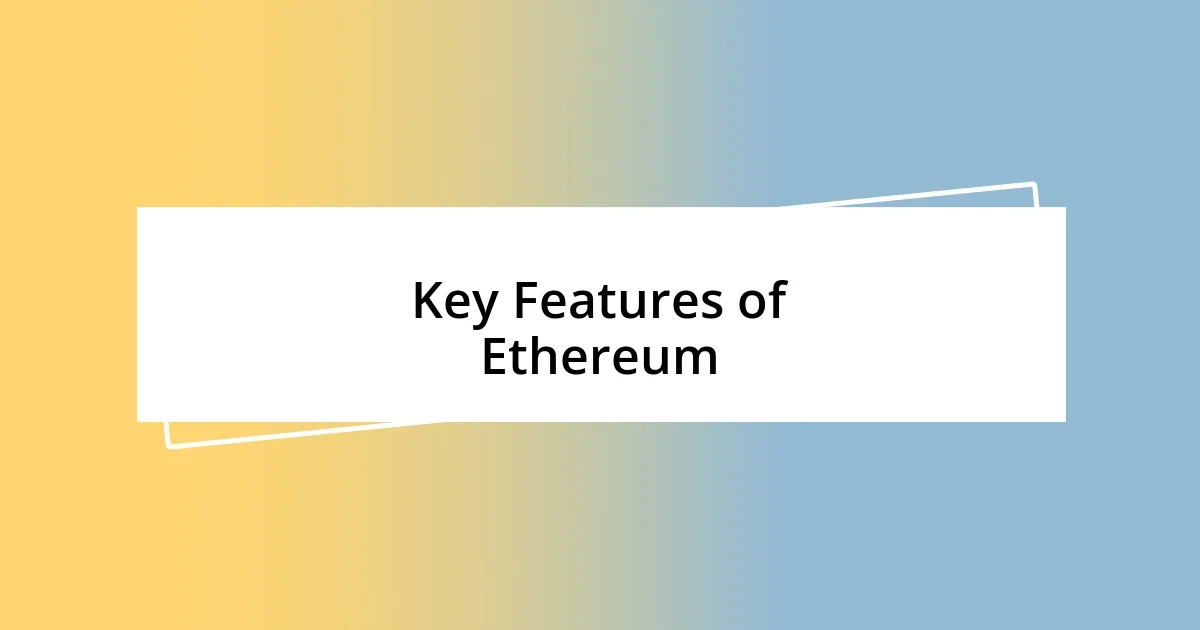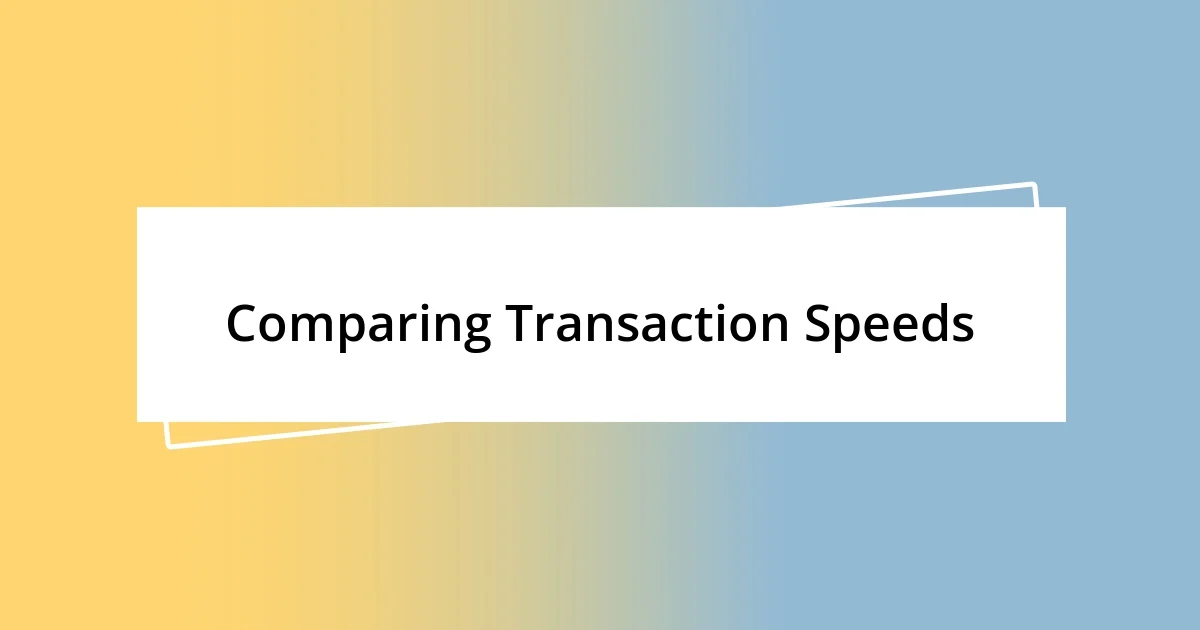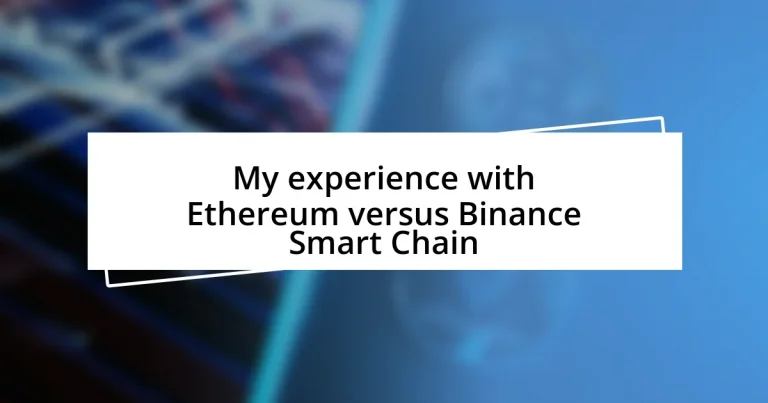Key takeaways:
- Ethereum offers robust smart contract functionality and a decentralized network, but struggles with scalability and high gas fees, particularly during peak times.
- Binance Smart Chain provides significantly faster transaction speeds and lower fees, making it more suitable for small transactions and high-demand scenarios.
- Security concerns vary between the two chains, with Ethereum’s decentralized proof-of-work model facing congestion issues, while Binance Smart Chain’s centralized validator model raises questions about its security robustness.

Key Features of Ethereum
One of the standout features of Ethereum is its robust smart contract functionality. I remember my first experience deploying a smart contract, and the thrill of seeing it execute automatically was unforgettable. It’s like creating a digital agreement that runs seamlessly without needing a middleman—think of the possibilities!
Another key aspect is Ethereum’s decentralized nature. This means that no single entity controls the network, which gives me a sense of freedom and security when working on projects. Have you ever thought about how empowering it feels to know that you’re part of a system that values transparency and accessibility for everyone?
Scalability has been a hot topic in the Ethereum community, especially with the rise of decentralized applications (dApps). I can relate to the frustration during peak times when transactions took longer than expected. However, the upcoming upgrades promise to enhance its efficiency dramatically, and I can’t help but feel optimistic about what the future holds for developers and users alike.

Comparing Transaction Speeds
When it comes to transaction speeds, my experience with Ethereum and Binance Smart Chain (BSC) has been quite contrasting. I remember waiting over 30 minutes for an Ethereum transaction to confirm during a busy period. It was a bit like watching paint dry—a mix of anticipation and mild frustration. On the other hand, Binance Smart Chain consistently blows me away with its rapid confirmation times, often completing transactions in just a few seconds. It’s like the difference between taking a leisurely stroll and sprinting down a track.
The capacity of each network also plays a significant role in transaction speeds. Ethereum has made strides recently, but I’ve encountered congestion that can slow things down considerably. During NFT drops, for instance, I found myself competing with countless users, all vying to get their transactions through. In contrast, BSC’s design seems to accommodate a higher volume of transactions without breaking a sweat, making it a more user-friendly experience for high-demand situations.
This experience leads to real-world implications for users and developers alike. I feel much more at ease initiating smaller transactions on BSC, knowing they will clear quickly, whereas Ethereum has made me rethink my approach to gas fees and timing. I wonder if others share this sentiment—do you feel more comfortable using one platform over the other based on how fast your transactions go through?
| Network | Average Transaction Speed |
|---|---|
| Ethereum | 5-30 minutes (varies with network congestion) |
| Binance Smart Chain | 3-5 seconds |

Analyzing Fees and Costs
When I started navigating fees and costs associated with both Ethereum and Binance Smart Chain, my initial thought was, “Am I prepared for the sticker shock?” Ethereum’s gas fees can be a rollercoaster. I remember one particular transaction that cost me over $100 in gas fees alone. It was a haunting reminder of how fluctuating prices could impact my budget. In contrast, using Binance Smart Chain felt like a breath of fresh air. The fees were often less than a dollar, making it much easier to experiment with smaller transactions without anxiety.
Here’s a quick breakdown of what I observed regarding fees:
-
Ethereum:
- High gas fees, especially during peak times.
- Transaction fees can range from $10 to over $100 based on network congestion.
- Fees can fluctuate dramatically, making budgeting tricky.
-
Binance Smart Chain:
- Significantly lower fees, often under $1.
- Consistent fee structure allows for better forecasting.
- Great for small transactions; I’ve felt comfortable sending tiny amounts without worrying about losing value.
These differences have made me reflect on my spending habits. I often think about how the costs associated with each platform shape the way I, and likely others, engage with dApps and crypto communities. It really does make a difference in how I approach my projects—wouldn’t you agree?

Security Considerations for Both Chains
Security is a pivotal factor when choosing between Ethereum and Binance Smart Chain. My experience has shown me that Ethereum relies on a robust proof-of-work mechanism, which, while traditionally considered secure, can pose challenges during periods of high activity. I recall a moment when my funds were in limbo due to network congestion and miners prioritizing certain transactions; it left me feeling uneasy about my assets’ safety.
On the other hand, Binance Smart Chain employs a consensus mechanism called proof-of-staked authority. Initially, I appreciated the speed, but I soon found myself questioning its security due to its somewhat centralized validator model. It raised a red flag in my mind. Can a system that relies on a more limited set of validators truly be as secure as a decentralized network? That thought lingered as I navigated my investments between the two chains.
I also learned about the importance of smart contract audits in both ecosystems. I remember diving into DeFi projects, and being impressed by Ethereum’s emphasis on audited contracts. It felt reassuring to see projects that took security seriously. In contrast, while BSC has its share of successful projects, I sometimes wonder if its rapid growth leads to less scrutiny. Have you ever hesitated to invest in a project after pondering its security vetting? From my perspective, taking time to research audits and community feedback is essential before diving into any platform.














